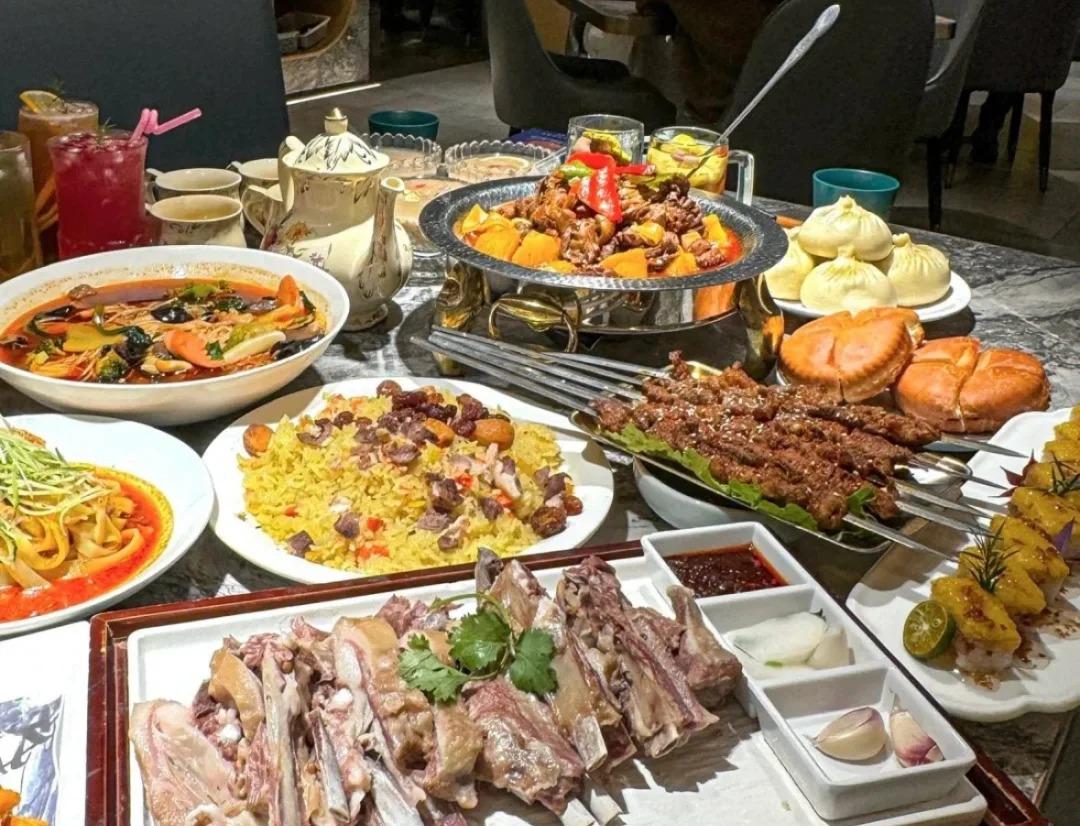
A Culinary Journey of Halal Delights in Shanghai: The Warmth and Legacy of Three Time-Honored Restaurants
Share
Having lived sixty years and wandered far and wide across the country, I’d always carried a quiet concern about finding Halal food before my trip to Shanghai. For us Muslims, after all, meals are never just about filling our bellies—they’re about purity and trust, a comfort we can barely bring ourselves to compromise on. So you can imagine my delight when this glittering, modern metropolis unfolded to reveal not just one, but several Halal eateries that felt like a warm hug from home. Yerishali, Hong Changxing, and Pin Huiwei—these three spots didn’t just satisfy my hunger; they wrapped this old man in the familiar warmth of faith, even miles away from the place I call home.
My first stop was Yerishali, and the second I pushed open its door, I was transported. The air hit me first: an intoxicating blend of baked nang (Uyghur flatbread)—warm, yeasty, and rich with the aroma of wheat—and that earthy, spiced scent that’s uniquely Xinjiang. It swept me right back to my younger years, when I’d travel for work in northwest China and the streets would smell exactly like this. The decor only deepened that nostalgia: vibrant Adras silk tapestries hung on the walls, their bold patterns identical to the ones my cousins weave back home; soft cushions printed with Kazakh pastoral scenes lined the wooden booths, inviting you to sink in; a copper milk tea pot in the corner puffed out wispy curls of steam, its surface glinting under the lights. Even the waitstaff felt like family—they wore blue jiapan (traditional Uyghur robes) stitched with delicate ethnic motifs, and their greetings (“Hello, Uncle!”) carried a Xinjiang lilt that turned the unfamiliarity of a big city into something cozy.

I didn’t hesitate to order the signature shouzhua fan (hand-grabbed rice). When it arrived, the enamel plate was still sizzling softly, and the aroma hit me like a wave—golden rice grains glistening with lamb fat, so fragrant I found myself swallowing before I even picked up my chopsticks. I stirred gently, and there they were: chunks of bone-in lamb, so tender that a light prod with my chopstick made the meat fall away from the bone. I took a bite, and it was perfect—juicy, rich with lamb’s natural sweetness, no hint of toughness, even for my aging teeth. But the real magic? The little surprises hidden in the rice: plump raisins that burst with sweetness and soft carrot chunks that added a fresh, tangy kick. They cut through the richness of the lamb fat, turning every spoonful into a dance of savory and sweet, layers of flavor that made me pause and smile.
The dapan ji (big plate chicken) that followed was a feast for the eyes first. Served on a wide blue-and-white porcelain platter, it was a riot of color: deep red sauce clinging to tender chicken pieces, bright green and red bell peppers scattered throughout, even a sprinkle of cilantro for a fresh pop. I took a bite, and the spice hit me just right—warm, fiery, but never harsh, seeping into the chicken so every bite was flavorful. The chicken itself was firm but not chewy, holding onto the sauce’s bold taste like a secret. And then there were the pida mian (belt noodles)—wide, thick, and springy, perfect for swirling through the thick, glossy sauce. I twirled a strand around my chopsticks, and it was like eating a hug—chewy, savory, more satisfying than any noodles I’d made at home. Mid-meal, a young waiter in a jiapan stopped by, grinning. “All our lamb and beef come from Halal-certified pastures,” he said, “and even the seasonings—cumin, chili, everything—we ship straight from Xinjiang. We don’t cut corners on the taste, or the rules.” I nodded, my heart light. That’s the thing about Halal food—it’s not just about what’s in the dish; it’s about the care behind it. Knowing they took that seriously? It made every bite taste better.
As I ate, Xinjiang folk songs played softly from the speakers, and I saw waitstaff tapping their feet to the rhythm, even pausing to hum along. The restaurant buzzed with laughter—families chatting, friends sharing plates, the clink of bowls and chopsticks. By the time I finished, my belly was full, but more than that, the tiredness from traveling had melted away. I sat there for a minute, watching the chaos and warmth, and thought: To find something this authentic, this real, in a city as big as Shanghai? That’s a gift.

Evening brought me to Hong Changxing—a century-old spot that feels like stepping into a storybook. The moment I walked in, the nostalgia hit hard: polished wooden tables and chairs that shone like they’d been loved for decades, vintage pendant lights casting a soft, golden glow, even the walls lined with old photos of the restaurant from years gone by. It reminded me of when I was a kid, tagging along with my dad to old Halal restaurants in Beijing—places where time moved slower, and every dish felt like a tradition.
The star here, of course, is the shuan yangrou (hot pot with sliced lamb). The waiter set down a plate of lamb slices, and I gasped a little—they were so thin, so delicate, that you could see the light through them, each slice marbled perfectly with fat. The broth in the pot simmered gently, clear and fragrant with a hint of ginger and green onion. I dropped a few slices in, and in seconds, they curled up, turning a pale pink. I fished one out, dipped it in the restaurant’s secret sesame sauce—creamy, nutty, with a touch of garlic—and took a bite. It was heaven. The lamb was so tender it melted in my mouth, no gaminess at all, just pure, fresh flavor. The sesame sauce wrapped around it like a blanket, rich but not heavy. I ate slice after slice, savoring every bite—this was the kind of food that makes you slow down, that makes you appreciate the simple things.

I also ordered fried spring rolls, and they didn’t disappoint. The outer skin was so crispy that it crackled when I bit into it, shattering into tiny crumbs. Inside, there was a mix of tender lamb diced small, crisp cabbage, and a hint of ginger—fresh, savory, a perfect contrast to the crunch of the shell. A waitress stopped by to refill my tea, and we chatted for a minute. “Hong Changxing’s been here for over a hundred years,” she said, her voice soft with pride. “We’ve always followed Halal rules—from choosing the lamb to making the sauce. Even when times change, we don’t change that. It’s what our customers trust us for.” I nodded, feeling a deep respect. In a world that’s always in a hurry to new things, to hold onto old traditions with such care? That’s rare. And that’s what makes this place special.
The next morning, I went in search of Pin Huiwei—a small, no-frills spot that felt like a neighborhood secret. It wasn’t fancy—just a few tables, a counter where the owner worked, walls lined with simple posters—but it was spotless, and the air smelled like beef soup and scallion pancakes. It felt like home.
I ordered a bowl of beef soup, and when it came, it was simple but perfect. The broth was clear as glass, with a few slices of tender beef floating on top, a sprinkle of chopped green onions, and a dash of white pepper. I took a sip, and warmth spread through my chest—rich, savory, not too salty, just the way good beef soup should be. The beef slices were thin but hearty, chewy in the best way, full of meaty flavor. I paired it with a scallion pancake, which came hot off the griddle. It was crispy on the outside, flaky and soft on the inside, layers of dough separated by bits of scallion that released their aroma with every bite. It tasted just like the pancakes my wife makes on weekends—simple, homemade, full of love.
The owner, a fellow Muslim brother with a weathered face and a kind smile, came over to chat while I ate. “I get up before dawn every day to go to the market,” he said, wiping his hands on his apron. “I pick the beef myself, make the soup fresh every morning. I just want my brothers and sisters to have a breakfast they can trust—something clean, something warm.” His words hit me right in the heart. This wasn’t a fancy restaurant, and the food wasn’t complicated, but it was made with care. It was the kind of meal that doesn’t just fill your stomach—it fills your soul. As I finished my soup, the sun was coming up over Shanghai, and the little restaurant was starting to fill with regulars—people greeting the owner by name, ordering their usuals. It felt like a community, a little piece of home in a big city.
By the end of my trip, those three meals had become more than just food—they were windows into Shanghai’s heart. Yerishali gave me the vibrancy of Xinjiang, a taste of faraway lands in a modern city. Hong Changxing gave me history, a link to the past, a reminder of how traditions keep us grounded. Pin Huiwei gave me warmth, the quiet comfort of a neighborhood spot where everyone knows your name. Together, they showed me something I hadn’t expected: that a big, busy city like Shanghai can be inclusive, can hold space for the faith and flavors of people from all walks of life.
As I packed my bags to leave, I found myself thinking about my grandson. Next time I come to Shanghai, I’ll bring him here— to Yerishali for the dapan ji, to Hong Changxing for the hot pot, to Pin Huiwei for the beef soup. I want him to taste these foods, not just for their flavor, but for what they stand for: the warmth of faith, the power of tradition, and the joy of finding home, even when you’re far away.








